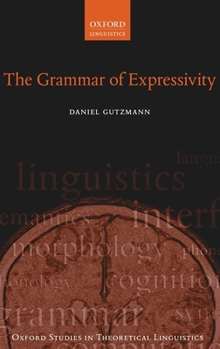The Grammar of Expressivity
Select Format
Select Condition 
Book Overview
This volume provides a detailed account of the syntax of expressive language, that is, utterances that express, rather than describe, the emotions and attitudes of the speaker. While the expressive function of natural language has been widely studied in recent years, the role that grammar plays in the interpretation of expressive items has been largely neglected in the semantic and pragmatic literature. Daniel Gutzmann demonstrates that expressivity has strong syntactic reflexes that interact with the semantic and pragmatic interpretation of these utterances, and argues that expressivity is in fact a syntactic feature on a par with other established features such as tense and gender. Evidence for this claim is drawn from three detailed case studies of expressive adjectives, intensifiers, and vocatives; their puzzling properties are accounted for through a minimalist approach to syntactic features and agreement, which shows that expressivity can partake in agreement operations, trigger movement, and be selected for syntactically. The analysis not only supports the hypothesis of expressive syntax, but also highlights the hidden role that grammar may play in phenomena that are traditionally considered to be solely semantic in nature.
Format:Hardcover
Language:English
ISBN:0198812124
ISBN13:9780198812128
Release Date:April 2019
Publisher:Oxford University Press
Length:312 Pages
Weight:1.49 lbs.
Dimensions:1.0" x 6.4" x 9.3"
Related Subjects
Language ArtsCustomer Reviews
0 rating





